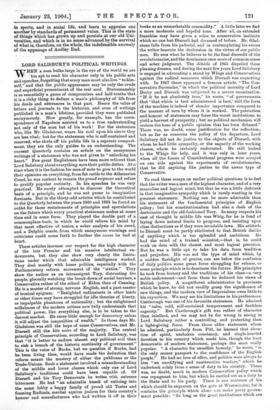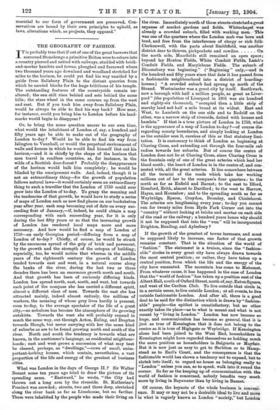W HEN a man bulks large in the eye of the
world we are too apt to read his character only in his public acts and speeches, forgetting that every man must also live "to him- Self," and that the public appearance may be only the crude and superficial presentment of the real soul. Statesmanship is so essentially a game of compromises and half-truths that it is a risky thing to deduce a man's philosophy of life from his deeds and utterances in that part. Hence the value of letters and journals to the historian, and even of writings published in a man's lifetime, provided they were published anonymously. How greatly, for example, has the corre- spondence of Napoleon assisted us to a true understanding not only of the man but of his work ! For the statesman who, like Mr. Gladstone, wears his soul upon his sleeve they are less vital ; but for the statesman who is self-contained and reserved, who shuts off his public life in a separate compart- ment, they are the only guides to an understanding. The current Quarterly contains an article on the anonymous writings of a statesman who was not given to "unlocking his heart." Few great Englishmen have been more reticent than Lord Salisbury about everything save their public duties. At a time when it is the fashion for men of note to give to the world their opinions on everything, from fat cattle to the Athanasian Creed, he was content to remain the grand seigneur and refuse to gratify popular curiosity. In his speeches he was very practical. He rarely attempted to discover the theoretical basis of a principle, and he was not prone to imaginative foreeasts. But in the thirty-odd articles which he contributed to the Quarterly between the years 1860 and 1883 he found an outlet for those restatements of principles and speculations on the future which every practical statesman makes at some time and in some form. They played the double part of a commonplace-book, in which he could relieve his Mind by that most effective of tonics, a sober analysis of his creed, and a Delphic oracle, from which anonymous warnings and criticisms could come forth to further the cause he had at heart.
These articles increase our respect for the high character of the late Premier and his massive intellectual en- dowments, but they also show very clearly the limita- tions under which that admirable intelligence worked. They deal mostly with home politics, especially with the Parliamentary reform movement of the "sixties." They show the author as an intransigent Tory, distrusting the people, gloomily watching the break-down of social barriers, a Conservative rather of the school of Eldon than of Canning. He is a master of strong, nervous English, and a past-master of ironical epigram. "Benighted enthusiasts in other lands or other times may have struggled for idle theories of liberty, or impalpable phantoms of nationality ; but the enlightened selfislmess of the modern artisan now fully understands that political power, like everything else, is to be taken to the dearest market. He cares little enough for democracy unless it will adjust the inequalities of wealth." In those days Mr. Gladstone was still the hope of some Conservatives, and Mr. Disraeli still the bête noire of the majority. The central principle of Conservatism, according to Lord Salisbury, was that "it is better to endure almost any political evil than to risk a breach of the historic continuity of government." This is the voice of Burke, but we question if Burke, had he been living then, would have made the deduction that reform meant the mastery of either the publicans or the Trade-Unions. Such a statement involved a misunderstanding of the middle and lower classes which only one of Lord Salisbury's traditions could have been capable of. Of Disraeli and his Tory Democrats he writes with extreme bitterness. He had "an admirable knack of enticing into the same lobby a happy family of proud old Tories and foaming Radicals, martial squires jealous for their country's honour and manufacturers who had written it off in their books as an unmarketable commodity." A little later we find a more moderate and hopeful tone. After all, an extended franchise may have given a voice to conservative instincts which no one but Disraeli had dreamed of before. Mr. Glad- stone falls from his pedestal, and in contemplating his errors the writer laments the declension in the virtue of our public men. He sees what he believes to be the final discredit of the revolutionaries, and the dominance once more of common-sense and sober judgment. The debtlele of 1865 dispelled these pleasing dreams, and during the next few years Lord Salisbury is engaged in advocating a stand by Whigs and Conservatives against the radical measures which Disraeli was coquetting with. In 1867 there appeared a famous article, "The Con- servative Surrender," in which the political morality of Lord Derby and Disraeli was subjected to a severe examination. "If it be not absolutely true," lie wrote, "of governments that 'that which is best administered is best,' still the form of the machine is indeed of slender importance compared to the manner of men by whom it is worked. The patriotism and honour of statesmen may force the worst institutions to yield a harvest of prosperity ; but no political mechanism will restore the tone of a public opinion that has been debased." There was, no doubt, some justification for the reflection ; but so far as concerns the policy of the departure, Lord Salisbury did not do justice to the objects of Disraeli, with whom he had little sympathy, or the sagacity of the working classes, whom he certainly underrated. He still looked to the Whigs for help, and it was only in later years, when all the forces of Constitutional progress were arrayed on one side against the experiments of revolutionaries, that he did anything like justice to the newer type of Conservative.
To read these essays on earlier political questions is to feel that the writer was a man of the highest character, and of a very masculine and logical mind, but that he was a little deficient in that imaginative sympathy which is rarely wanting in the greatest statesmen. Nothing can be more admirable than his statement of the fundamental principles of English policy ; but his constitutionalism had also a dash of the doctrinaire and the old-fashioned Tory. In many respects his cast of thought in middle life was Whig, for he is fond of laying down natural limits to progress, and insisting upon class distinctions as if they were inviolable laws. His attitude to Disraeli must be partly attributed to that British dislike of anything which is too splendid and ambitious. He had the mind of a trained scientist,—that is, he could work on data with the closest and most logical precision. But he was a little apt to take his data from tradition and prejudice. His was not the type of mind which, by a sudden flashlight of genius, can see below the confusion of daily politics some great force struggling for release, or some principle which is to dominate the future. His principles he took from history and the traditions of his class—a very noble endowment—and from them he deduced his views of British policy. A magnificent administrator in provinces which he knew, he did not readily grasp the significance of new things, and the modern view of Imperialism owes little to his exposition. We may see his limitations in his preferences. Castlereagh was one of his favourite statesmen. He admired his "calm, cold, self-sustained temperament and faultless sagacity." But Castlereagh's gift was rather of character than intellect, and we may not be far wrong in seeing in Lord Salisbury rather a controlling and protecting than a light-giving force. From those older statesmen whom he admired, particularly from Pitt, he learned that eleva- tion of spirit, unshaken constancy, and single-hearted devotion to his country which made him, though the least democratic of modern statesmen, perhaps the most really popular. "A character for unselfish honesty," he wrote, "is the only secure passport to the confidence of the English people." He had no love of office, and politics were always to him "an unedifying and unattractive warfare," which he undertook solely from a sense of duty to his country. There was, no doubt, much in modern Conservative policy which was repugnant to him, but which he carried out as a duty to the State and to his party. There is one sentence of his Which should be engra.ven on the gate at Westminster, for it contains the principle which alone c en make party govern- ment possible : "So long as the great institutions which are











































 Previous page
Previous page